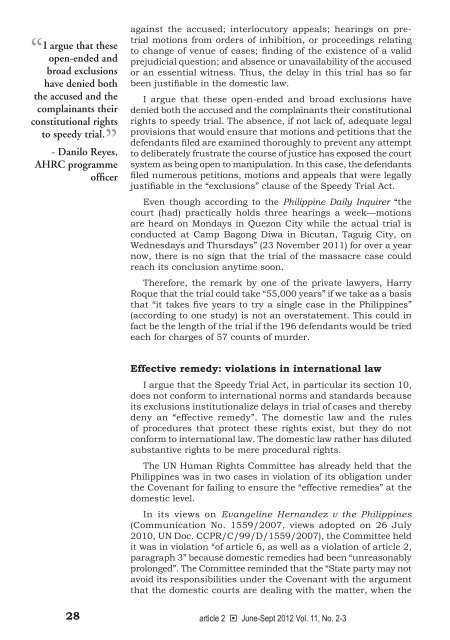You also want an ePaper? Increase the reach of your titles
YUMPU automatically turns print PDFs into web optimized ePapers that Google loves.
“<br />
I argue that these<br />
open-ended and<br />
broad exclusions<br />
have denied both<br />
the accused and the<br />
complainants their<br />
constitutional rights<br />
to speedy trial.<br />
”<br />
- Danilo Reyes,<br />
AHRC programme<br />
officer<br />
28<br />
against the accused; interlocutory appeals; hearings on pretrial<br />
motions from orders of inhibition, or proceedings relating<br />
to change of venue of cases; finding of the existence of a valid<br />
prejudicial question; and absence or unavailability of the accused<br />
or an essential witness. Thus, the delay in this trial has so far<br />
been justifiable in the domestic law.<br />
I argue that these open-ended and broad exclusions have<br />
denied both the accused and the complainants their constitutional<br />
rights to speedy trial. The absence, if not lack of, adequate legal<br />
provisions that would ensure that motions and petitions that the<br />
defendants filed are examined thoroughly to prevent any attempt<br />
to deliberately frustrate the course of justice has exposed the court<br />
system as being open to manipulation. In this case, the defendants<br />
filed numerous petitions, motions and appeals that were legally<br />
justifiable in the “exclusions” clause of the Speedy Trial Act.<br />
Even though according to the Philippine Daily Inquirer “the<br />
court (had) practically holds three hearings a week—motions<br />
are heard on mondays in Quezon City while the actual trial is<br />
conducted at Camp Bagong Diwa in Bicutan, Taguig City, on<br />
wednesdays and Thursdays” (23 november 2011) for over a year<br />
now, there is no sign that the trial of the massacre case could<br />
reach its conclusion anytime soon.<br />
Therefore, the remark by one of the private lawyers, harry<br />
Roque that the trial could take “55,000 years” if we take as a basis<br />
that “it takes five years to try a single case in the Philippines”<br />
(according to one study) is not an overstatement. This could in<br />
fact be the length of the trial if the 196 defendants would be tried<br />
each for charges of 57 counts of murder.<br />
Effective remedy: violations in international law<br />
I argue that the Speedy Trial Act, in particular its section 10,<br />
does not conform to international norms and standards because<br />
its exclusions institutionalize delays in trial of cases and thereby<br />
deny an “effective remedy”. The domestic law and the rules<br />
of procedures that protect these rights exist, but they do not<br />
conform to international law. The domestic law rather has diluted<br />
substantive rights to be mere procedural rights.<br />
The un human Rights Committee has already held that the<br />
Philippines was in two cases in violation of its obligation under<br />
the Covenant for failing to ensure the “effective remedies” at the<br />
domestic level.<br />
In its views on Evangeline Hernandez v the Philippines<br />
(Communication no. 1559/2007, views adopted on 26 July<br />
2010, un Doc. CCPR/C/99/D/1559/2007), the Committee held<br />
it was in violation “of article 6, as well as a violation of article 2,<br />
paragraph 3” because domestic remedies had been “unreasonably<br />
prolonged”. The Committee reminded that the “State party may not<br />
avoid its responsibilities under the Covenant with the argument<br />
that the domestic courts are dealing with the matter, when the<br />
article 2 � June-Sept 2012 Vol. 11, No. 2-3


